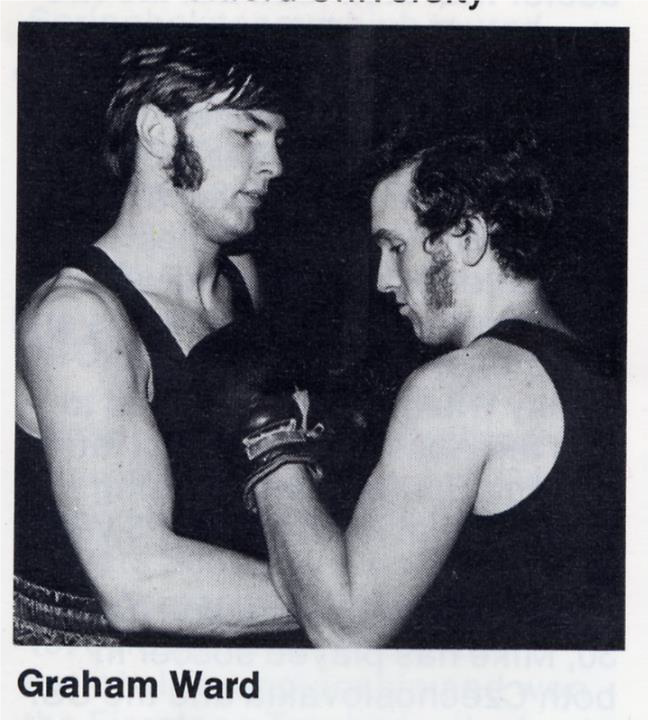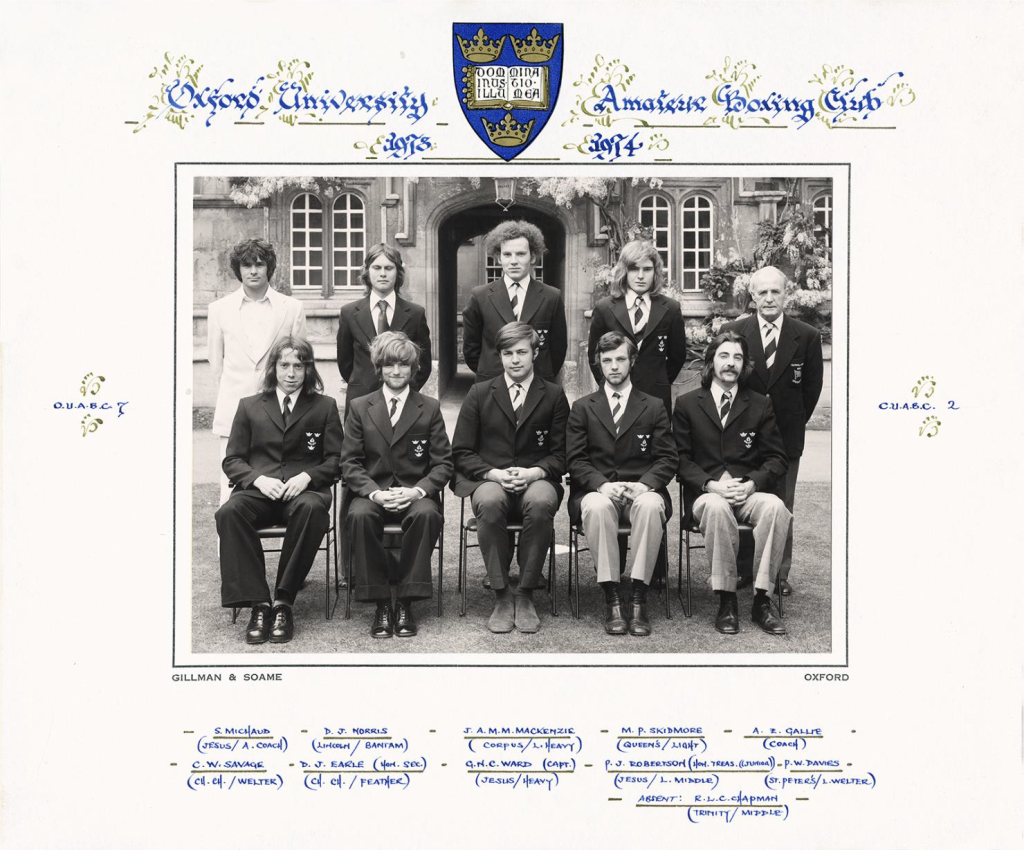I played for the College First XV in every year from 1970 to 1974.
Each of these three teams came first in the First Division of the intercollege Rugby Union league, (the 1970/71 team being the first Jesus College team to achieve this since the early 1920s), and were runners up in Cuppers.
I was also part of the winning crew in The Hardy Fours in, I believe, 1972 or 1973.
In addition, I won three Boxing Blues and was Captain of the Oxford University Amateur Boxing Club for the 1973/74 season. The team I captained beat Cambridge 7 bouts to 2: the greatest winning margin since 1954 and achieving the first Oxford hat trick since 1901.

Graham Ward (left) sparring.
Q&A WITH GRAHAM WARD from the OUABC Alumni Newsletter 2023
I’m pretty sure that every in-take of aspiring boxers who join OUABC hear stories of characters who have gone before them, who have helped to move the club forward and ensure it is there for subsequent generations. One of the names I used to hear when I came up in 1984 was that of Graham Ward. Graham, a heavyweight blue in 1972, 1973 and 1974, was supporting the club a decade later and is too modest to mention here the ways in which he helped former boxers after they graduated. The 1974 7-2 win over Cambridge under his captaincy, that he mentions below, was somewhat legendary and something to aspire to, something we were delighted to repeat in 1988.
Graham remains interested in and committed to OUABC, and it is always great to meet up with him at Varsity Matches and functions, even if those opportunities have been limited in recent years. Here he reflects on his involvement with the club.

The University of Oxford Amateur Boxing Club team of 1973/74.
What was your boxing experience before going up to Oxford?
Rather limited. When I went to Dulwich College, in 1963, every boy had to box as part of the PE curriculum. Also, I took part in inter-house bouts and won a few medals (as well as losing a few!). As a result of safety concerns, however, both inter and intra school boxing was soon severely limited, and virtually non-existent by the time I came up to Oxford in 1970.
How did you get involved with OUABC?
Len Goff: the landlord of The White Horse in The Broad, was a great fan of boxing and, in particular, of OUABC. One evening at the beginning of Trinity Term 1971, he mentioned that Julian Malins was going down, thereby creating a vacancy for a new Oxford heavyweight. Len challenged me to have the courage to have a go and I could not resist the dare. On arriving in the gym, I was made to feel really welcome by Alf Gallie, Bob Nairac and Shane Fane-Hervey and very much enjoyed the training and spirit of the Club. I was hooked.
Do you remember your first bout for OUABC?
It was against a huge Irish Guardsman. Having touched gloves, I thought that something special was needed to survive. After the bell rang, I moved to the centre of the ring and hit him with a left right combination. He went down like a stone and was counted out. The bout had lasted 13 seconds, including the count. Much relieved, I thought “I could get to like this!”.
What did you enjoy most about being part of OUABC?
Being chosen to box against Cambridge in the 1972 Varsity Match was a very, very special moment. The wonderful team spirit of OUABC is, however, my most abiding, positive memory. Non-boxers see only the bouts: one against one. What they often do not see is the huge mutual support which boxers and coaches give to each other in training and Club life. There is nothing else like it.
What did you enjoy least about being part of OUABC?
Losing the bouts in my Varsity matches.
Which was your toughest bout?
On a mixed card, I came up against a very tough opponent who seemed to feel no pain and never stopped coming forward. I was relieved to beat him on points. It was only after the bout that Bob Nairac told me that my opponent had just come out of Wandsworth Prison following a ten year stretch for GBH!
Who was your most difficult sparring partner?
David Holmes. He was a first class boxer and a very foxy mover in the ring. We were very fortunate to have him as Coach after Percy Lewis retired from the role.
Apart from the above, what is your abiding memory of boxing at Oxford?
The camaraderie of life with fellow boxers and the respect in which we were held.
Did you box at all after you left Oxford?
No. I joined Price Waterhouse and had to put in a great deal of overtime, work away from home and study for professional exams. There was simply no time for serious sport.
What are you doing these days?
Having qualified as a chartered accountant, I became a Partner and then World Utilities Leader in Price Waterhouse (now PwC). Subsequently, I was blessed by being able to serve in leadership positions in a number of fields. For example: the Crown, as Auditor of The Duchy of Cornwall; my profession, as President of the Institute of Chartered Accountants in England & Wales and as President of the International Federation of Accountants; the energy sector, as Vice Chair of the World Energy Council; Parliament, as founding Chief Commissioner of The Independent Commission for Aid Impact; the aviation sector and its customers, as a Director of the Civil Aviation Authority. At present, I am a Fellow of Dulwich College and of Goodenough College. Also, in 2004, I was blessed by being appointed CBE and being invested by Her late Majesty.
If you could give one piece of advice to boxers at OUABC today, what would it be?
May I offer three?
– Support your teammates and respect your coaches
– Work hard
– Think, focus and give your all in the ring.
Who is your favourite boxer of any era?
Henry Cooper. He was an excellent boxer with bottomless heart in and out of the ring. Perhaps most important of all, he understood and lived the responsibility of a champion to be a role model.
Any other thoughts?
Being elected Captain in the summer of 1973 was a huge honour. It also was a daunting one. In the 1973 Varsity Match, under Peter Davies’ Captaincy, we had beaten Cambridge 5-4 in Cambridge. The first time that we had won in Cambridge since before the Second World War. Our challenge was to achieve the first Oxford hat trick since 1901. The coaches Alf Gallie, Percy Lewis, David Holmes and Steve Michaud (an outstanding boxer – Golden Gloves Champion, US Fifth Army Champion, Blue in 1972 and 1973, who stood down from the ring in 1974 to help with coaching us) and the team were magnificent and, in March 1974, we beat Cambridge 7-2. This was the greatest winning margin since 1954 and it was not equalled until 1988.
Being a Boxing Blue makes one a very attractive proposition for a business which is looking to recruit. The following characteristics are particularly attractive:
– Knowing how to take responsibility for one’s own actions. There is nowhere to hide and no-one else to blame in the ring.
– Being a great team player, through the mutual support amongst the team members in training.
– Understanding how to take and improve from constructive criticism, through the experience of being coached.
Steve Michaud, also a Jesus College man, boxed for OUABC in the 1972 and 1973 Varsity Matches and was Assistant Coach for the 1974 Varsity Match. Steve was an absolutely outstanding boxer being, inter alia, a Golden Gloves Champion and an US Fifth Army Champion. Another Jesus College man: the late Peter Robertson, boxed for OUABC in the 1974 Varsity Match.
